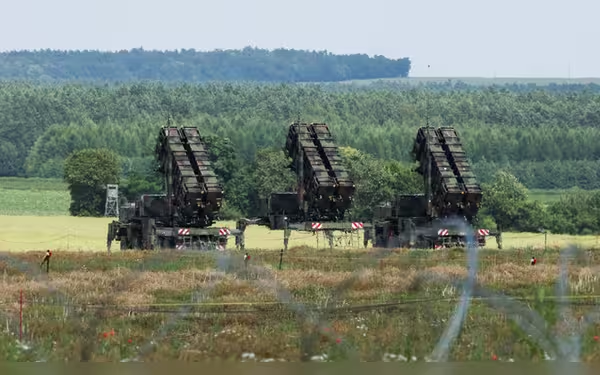Sunday, December 22, 2024 09:34 AM
Georgia Suspends EU Accession Talks Amid Protests
- Georgian Dream halts EU accession discussions.
- Protests erupt in Tbilisi against government actions.
- 80% of Georgians support EU membership.
 Image Credits: arabnewspk
Image Credits: arabnewspkGeorgia's ruling party suspends EU talks, sparking protests in Tbilisi as citizens demand closer ties with Europe.
In a significant development, the political landscape in Georgia has taken a tumultuous turn as the ruling party, Georgian Dream, announced its decision to suspend talks regarding European Union (EU) accession. This decision comes alongside a refusal to accept any budgetary grants from the EU until 2028. The announcement has sparked widespread protests in the capital, Tbilisi, where police clashed with demonstrators who were advocating for closer ties with Europe.
The protests erupted early on Friday, with police reporting injuries among their ranks as they attempted to disperse crowds using water cannons, pepper spray, and tear gas. The demonstrators, many of whom were masked, expressed their anger by attempting to breach the parliament building and hurling fireworks at law enforcement. The atmosphere was charged, with chants of "Russians" and "Slaves!" echoing through the streets, reflecting the deep-seated frustrations of the populace.
Georgia, a nation of approximately 3.7 million people, has long harbored aspirations of joining the EU, a goal enshrined in its constitution. However, relations with Brussels have soured in recent months, with the EU accusing the Georgian government of adopting authoritarian measures and leaning towards pro-Russian policies. The EU had already frozen Georgia's application for membership, further complicating the country's European ambitions.
In response to the protests, the figurehead president of Georgia condemned the government's actions, stating that it had declared "war" on its own citizens. This sentiment was echoed by opposition leaders who criticized the ruling party for what they termed a betrayal of the Georgian people. The opposition has also raised concerns about the legitimacy of the recent elections, claiming that the ruling party's victory was marred by fraud.
Georgian Dream, however, maintains that it is committed to democracy and integration with the West, despite its recent actions. The party has accused the EU of using the prospect of accession talks as a means of "blackmail" and has vowed to keep the issue off the agenda until 2028. This stance has only intensified the divide between the government and the pro-EU opposition.
As the situation unfolds, it is clear that the aspirations of the Georgian people for EU membership remain strong, with opinion polls indicating that around 80 percent support joining the bloc. The EU flag continues to fly alongside the national flag at government buildings, symbolizing the enduring hope for a European future.
The current crisis in Georgia highlights the complex interplay between national identity, political aspirations, and international relations. As the government navigates its path forward, the voices of the Georgian people will undoubtedly play a crucial role in shaping the future of the nation. The ongoing protests serve as a reminder that the desire for democratic governance and alignment with Europe remains a powerful force in Georgian society.













